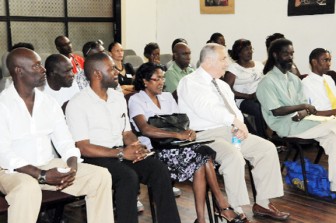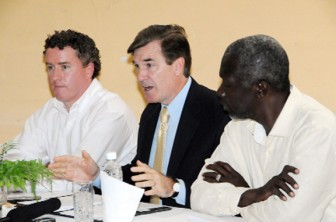Non-governmental organisations (NGOs) across Region 10 came in for high praise from US Ambassador Brent Hardt for their contributions to the development of their communities, as he highlighted the need for them to take advantage of creative networking opportunities in the light of reduced donor support.
Ambassador Hardt was in Linden on February 8th on his first official visit to the town in relation to the results of a survey of civil society organisations in Region 10, conducted by the Linden Fund Trust (LFT) under the United States Agency for International Development (USAID) Governance Enhancement Project (GEP).
At the official reporting session held in the conference centre of the Linden Enterprise Network, Hardt told the small gathering that unlike the situation in other countries, where there is high dependency on governments to initiate and spearhead community development, Region 10 has a cadre of NGOs that play a significant role in community development.

He said that based on studies conducted it is a known fact that community service organisations (CSOs) are very active at the community level and play a vital role in development.
“Here in Linden, the Linden Care Foundation has been providing urgently needed services to orphans and vulnerable children and essential care and support to persons living with HIV/AIDS. Again in Linden, the Linden Legal Aid Centre has been providing invaluable legal and related services to disadvantaged persons as a means of improving their access to justice,” Hardt noted.
He added that there were many other examples of the good works that CSOs have done and are doing, and very often the works of these organisations are not known to the wider public.

It is hoped that as a result of the survey done by the LFT there will be increased public awareness of the diverse range of organisations, their importance, missions, accomplishments and the obstacles they encounter as they seek to fulfil their missions.
“The results should also afford a firmer foundation of knowledge for CSOs to assess their strengths and weaknesses and identify ways in which they can better fulfil their missions and serve their membership and communities,” said the US Ambassador.
Hardt noted that the survey results can be used for creative networking among organisations in Region 10 so that CSOs can benefit from lessons learnt and experiences gleaned from others.
The ambassador acknowledged that the changing environment of reduced donor support has eroded many traditional sources of funding and he advised that in such cases it is vital for organisations to take advantage of networking opportunities, increasing their efficiency, and enhancing the effectiveness of their operations.
They should also seek to engage the private sector, which can play a role in supporting civil society in ways that can enhance security, boost economic activity, and strengthen the communities in which their businesses operate.
“So to the private sector representatives here, I would say an investment in civil society organisations is a sound investment in the future of your community,” Hardt declared.
Passionate
Meanwhile GEP Deputy Chief of Party, Kevin McLaughlin, said the survey has confirmed that civil society in Linden is active, passionate and committed to their individual tasks while referring to the forum as a channel to increase awareness of Region 10’s CSOs, their capacities and challenges and to foster partnerships to support the development of Linden and the wider Region 10.
According to the summary of the report presented by LFT Trustee, Samuel Wright, CSOs are potentially important agents of change in the development of Linden and Region 10. While there is a large number of CSOs working on a wide variety of developmental projects in the community, their impact is not readily evident.
The assessment of the CSOs was based on questionnaires, site visits, and consultations with the private sector and local government.
Sections of the questionnaires matched the criteria used to assess the status and sustainability of CSOs – these included Mission and Goals, Management/Governance, Operations, Financial Management/Funding, External Relationships and Performance Indicators.
The objective of the assessment was to determine the limiting factors to the CSOs’ effective functioning and optimal operation.
The results of the evaluation will be used to support targeted capacity-building programmes. Tasks were designed and executed in support of the assessment, including a public awareness programme, an inventory of CSOs in Linden and Region 10, a survey of CSOs, site visits, and a focus group.
The public awareness programme was designed to inform the community of the survey and enhance the public’s awareness of the CSOs and their efforts in Linden and Region 10. The inventory of CSOs unearthed many existing entities and supported the thesis that there are several organizations engaged in community development but they are unheralded and lack visibility. The survey of the CSOs was conducted by experienced researchers using a specially designed questionnaire. Site visits complemented the field survey, ensured completeness of data collected, and facilitated better appreciation of the conditions under which the CSOs operated.
The focus group was designed to foster a collective understanding of the status and concerns of the CSOs through shared discussions and interactions.
A total of 23 persons representing 18 CSOs participated in the focus group. The participants unanimously endorsed the formation of the Region 10 CSO Forum to facilitate collaboration and resource-sharing among CSOs, improve their visibility in Region 10, and to address the shortage of resources and fundraising challenges.
The participants also urged that the Region 10 CSO Forum promote the development of CSOs and support their participation in all areas of community development.
Based on the findings, most of the CSOs were formed to address a perceived need within the local community and targeted a specific constituency, and only a few CSOs have any real region-wide focus.
Almost all of the CSOs have mission statements, but, in many cases, their preparation was perfunctory or driven by regular practice or registration requirements rather than as a basis for establishing direction and purpose of the CSO. The scope and focus of many CSOs had evolved opportunistically without a corresponding revision of the mission statement.
Registered entities
The CSOs, with few exceptions, are registered entities; mostly as friendly societies. However, in the operations and management, the CSOs so registered do not strictly adhere to the provisions of the Friendly Societies Act. They generally have basic management structures in place with directors, officers, and committees.
However, while management structures are in place, the organizations are generally run by a small number of dedicated officers or members. This limits both the organizations’ effectiveness in meeting their objectives and their ability to respond to the needs of their constituents.
Most of the CSOs that responded to the questionnaire operate as project-based entities. While they are effective in developing projects and activities in response to community needs, their ability to develop and execute the programmes are limited by the lack of supporting infrastructure, inadequate resources, including funding, and limited membership and volunteer bases.
Their almost exclusive dependence on in-house capacity and skills require that there be access to training and other means of increasing capacity.
Responses to the survey/questionnaire further indicated that the basic financial management practices of the CSOs reflect their registration as Friendly Societies. With few exceptions, the smaller CSOs have associations with banking institutions, have annual reporting cycles and have annual financial audits.
Funding is often project-specific and remains a major challenge for the CSOs. Sources of funding are the local and national private sector, donor agencies, and fundraising activities.
One possible solution to funding challenges is better coordination of CSO fundraising activities and collective engagement with donor agencies; but this would require better definition of mission and goals and better long-term and strategic planning.
Good and informed external relationships are critical to the sustainability of CSOs, the survey noted. The region’s CSOs generally do not maintain strong external relationships. Even in cases where CSOs have similar focus areas or constituencies, there was no substantial collaboration or coordination among the organizations.
The level of membership, number of projects initiated, and response of the target groups are the primary indicators used by the CSOs to track or evaluate their performance. The information from this self-evaluation is not regularly shared with target groups or other related organizations.
The range and variation of CSOs’ target groups and areas of interests indicate the basis for collaboration with local government agencies. The CSOs currently do not have the capacity to match their potential, therefore a capacity-building and sustainability programme is recommended.
The range of sizes of CSOs in Region 10 and their levels of maturity suggest that the capacity-building programme would be best coordinated through an oversight body. In that light, the proposed Region 10 CSO Forum could provide the organisational reference to implement the required capacity-building and sustainability initiatives.
Wright said that based on the review of questionnaires, site visits, and consultations with CSOs and private sector entities, a capacity-building and sustainability programme was developed for Region 10 CSOs.
The programme includes the organisation of the Region 10 CSO Forum, a sustainability road map for Region 10 CSOs and resource acquisition and management.
The CSO conducted by the LFT was the last to be implemented by USAID under the GEP, which comes to an end in March.





